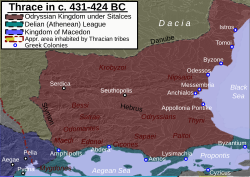Odrysian kingdom
| Odrysian Kingdom | ||||||||||
|
||||||||||
|
Odrysian kingdom under Sitalces
|
||||||||||
| Capital | Not specified | |||||||||
| Languages | Thracian language | |||||||||
| Religion | Polytheism | |||||||||
| Government | Monarchy | |||||||||
| Historical era | Classical Antiquity | |||||||||
| • | Teres | 480 BC | ||||||||
| • | Roman conquest | 46 AD | ||||||||
|
||||||||||
| Today part of |
|
|||||||||
The Odrysian Kingdom (/oʊˈdrɪʒən/; Ancient Greek: Βασίλειον Ὀδρυσῶν, Latin: Regnum Odrysium) was a state union of over 40Thracian tribes and 22 kingdoms that existed between the 5th century BC and the 1st century AD. It consisted mainly of present-day Bulgaria, spreading to parts of Northern Dobruja, parts of Northern Greece and parts of modern-day European Turkey.
It is suggested that the kingdom had no capital. Instead, the kings may have moved between residences. A capital was the city of Odryssa (assumed to be Uscudama, modern Edirne), as inscribed on coins. Another royal residence believed to have been constructed by Cotys I (383-358 BC) is in the village of Starosel, while in 315 BC Seuthopolis was built as a capital. An early capital was Vize. The kingdom broke up and Kabyle was a co-capital by the end of the 4th century BCE.
The Odrysians (Odrysae or Odrusai, Ancient Greek: "Οδρύσαι") were one of the most powerful Thracian tribes that dwelled in the plain of the Hebrus river. This would place the tribe in the modern border area between Southeastern Bulgaria, Northeastern Greece and European Turkey, centered around the city of Edirne. The river Artescus passed through their land as well. Xenophon writes that the Odrysians held horse races and drank large amounts of wine after the burial of their dead warriors. Thucydides writes on their custom, practised by most Thracians, of giving gifts for getting things done, which was refuted by Heraclides. Herodotus was the first writer to mention the Odrysae.
...
Wikipedia

